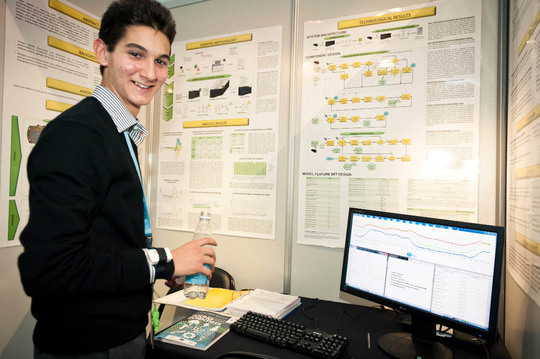THE
Castleknock student who wowed judges to become BT Young Scientist of the Year
last January has gone a step further by scooping another top prize in Europe
for his winning project.
Teenager
Alexander Amini, was crowned EU Young Scientist in Helsinki earlier this month
topping off a brilliant year of success for the youngster who moved to Ireland
just last year.
The
Castleknock College student has spent months perfecting his winning
computerised system designed to help tennis players improve their game.
The
impressive project uses sensors to identify and analyse various types of tennis
shots that can not only help tennis stars and ordinary players to develop the
perfect swing but it also has the potential to be used to track movement in
patients recovering from injury.
The
programme, which has 30,000 lines of algorithmic code, learns how a player
performs all the major racquet swings and then automatically identifies any
shot the player hits.
Using
sensors attached to the arm, leg and chest, it detects patterns and subtle
variations in movement and can differentiate between even the most closely
related strokes.
Technology
already exists to measure the speed of three tennis shots taken by a player,
but Alexander’s system can measure 13. And with his system also useful in other
fields, such as in the field of medicine in improving movement after an injury,
the opportunities for Alexander and his system are endless.
Alexander,
who lives at Porterstown Road, spoke to Northside People after his success at
the BT Young Scientist competition and explained how he developed his system.
“The
project took four and a half months to develop a system that can be applied
across many areas,
? explained Alexander who is himself a keen tennis player.
“However,
it was easy for me to convey to the public how it worked through tennis.
“The
system was relatively easy for me to develop but the hardest part was
constantly going back to refine it to get it to a presentable point.
?
Despite
his young age Alexander has already studied extensively in his field of
expertise.
“I’ve
taken two years of computer programming in many languages such as Java and
Python,
? he said.
“I’d
definitely like to major in some area of engineering after school, possibly
computer science or software development.
“Eventually,
I’d like to be an innovator creating my own business concepts and ideas.
“I have
many more ideas and inventions in the pipe-line.
?
Alexander’s
teachers at Castleknock College are rightfully proud of their top student
Speaking
from Helsinki Principal Oliver Murphy expressed his delight at the student’s
success.
“We are
delighted for Alexander who has worked so hard over the last 18 months on this
project,
? he said.
“It is a
proud day for the Aminis, for Ireland and for Castleknock College.
?
Science
teacher Mr Kieran Gallagher, who was Alexander’s mentor throughout the project,
was in no doubt about its potential.
“Since
Alexander first entered the project for the BT Young Scientist competition I
felt that this could be a winner,
? he said.
“Today,
I am delighted that Alexander has been recognised at an international level as
well. He is a most exceptional student to work with.
?
Local
councillor, David McGuinness (FF) also congratulated Alexander for what he
described as his
“historic victory.
?
“Alexander,
and his family, should be rightly proud of his momentous achievement,
? he said.
“I would also pay tribute to his teachers who helped him to achieve such a
phenomenal result. As a young teacher, I know first-hand the effort that goes
in behind the scenes to assist pupils reach such great outcomes.
“I would
now wish Alexander the very best in what is clearly going to be a very bright
future.
?
The
European Union (EU) Contest for Young Scientists is an initiative of the
European Commission. The contest is the annual showcase of the best of European
student scientific achievement.
The
competition has three winners – Alexander is joined by winners from Lithuania
and Switzerland – each winning
?¬7,500.
Alexander
was also awarded a place at the London International Youth Science Fair and The
Stockholm International Youth Science Award.
